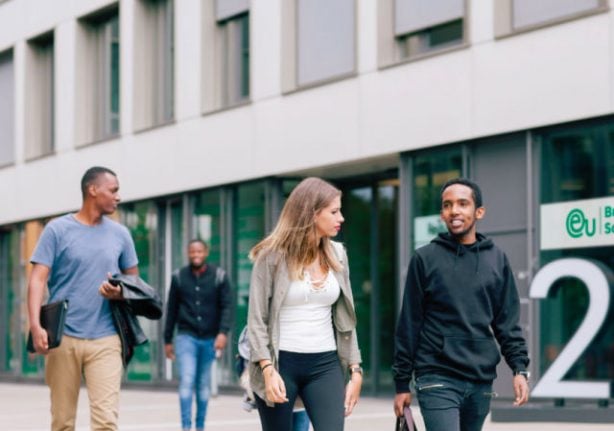Mykhailo Sydorenko (28) made the move from his native Ukraine to Germany to study his MBA at the EU Business School campus in Munich. With affiliations with top universities around the world and a challenging academic program, it was a natural fit for Mykhailo.
“I had already got a master’s degree in economics in Kiev but I knew that if I wanted to have an international career in business then I needed to go abroad and get a foreign education. The MBA program appealed to me as it covered a lot of aspects that were essential for me in my future professional development,” he tells The Local.
 Photo: Mykhailo Sydorenko
Photo: Mykhailo Sydorenko
Since being founded in 1973, EU Business School has earned a reputation for academic excellence. With campuses in Barcelona, Geneva, Montreux and Munich as well as one online, the school boasts a truly international environment with 95 percent of the students coming from abroad.
Find out more about EU Business School
All courses are taught in English with EU Business School offering foundation, bachelor’s, master’s, MBA, DBA, and further education programs. Among their business focus areas are communications, tourism management, international business, marketing, finance, digital business, entrepreneurship and business administration.
During their studies, students are given the option to transfer between EU's four campuses, while internships are encouraged as part of the MBA program. Getting hands-on experience in the workplace was a major part in Mykhailo in deciding to make the move overseas.
 Photo: EU Business School's Munich campus
Photo: EU Business School's Munich campus
“While studying at EU Business School, I used the opportunity to do internships. I did two internships and they were both very useful in terms of helping me decide what I did and didn't want to do,” he says.
After enrolling in the MBA program in 2014, which was run in partnership with the University of Roehampton in the UK, Mykhailo began an internship with German bank HypoVereinsbank followed by an internship at GE Healthcare.
“Doing the internships helped me understand in what direction I wanted to go as my intention was to get into corporate finance. I was fortunate that I got a lot of responsibility in my internship doing financial planning and analysis and was directly responsible for reporting for a whole DACH region,” says Mykhailo.
Learning by doing aka 'experiential learning' is a cornerstone of the EU Business School methodology. In its 45 years, the school has established connections to multiple businesses and has had access to some of the top business brains in the world.
Find out more about EU Business School
Students are given the chance to pick the minds of guest speakers who come to the campuses and there are company visits to international organisations. Previous guest speakers have included Peter Brabeck-Letmathe (Emeritus Chairman of Nestlé) and the late former UN Secretary-General of the United Nations, Kofi Annan.
 Photo: Peter Brabeck-Letmathe
Photo: Peter Brabeck-Letmathe
For Mykhailo, the core academic program was particularly interesting and different to what he was used to back home.
“In Ukraine the education was quite theoretical. In the MBA program at EU Business School the business cases were most valuable in terms of practical application in my daily work and the professors, who worked there, were also involved in various companies and shared their valuable practical experience with us,” he says.
Find out more about EU Business School
After graduating, Mykhailo took up a position in Audit of Financial Services with one of the “Big Four”, multinational professional services giant KPMG, before moving to British accountancy and business advisory firm Baker Tilly located in Munich. Indeed, 93% of students from EU Business School accept a job offer within six months of graduation.
Now firmly established in Munich, his decision to study at EU Business School has yielded a valuable dividend in the shape of his recent promotion to a senior position at Baker Tilly working in audit and advisory.
“Doing the course has definitely helped me get a great job. The MBA program was excellent and my classmates came from all over the world, which gives you a new perspective on things. Some of them stayed in Germany and found jobs, while others went home and got good jobs,” says Mykhailo.
He adds, “And Munich is a great city to live in. It gives broad opportunities to develop your business career.”
This article was produced by The Local Creative Studio and sponsored by EU Business School.



 Please whitelist us to continue reading.
Please whitelist us to continue reading.